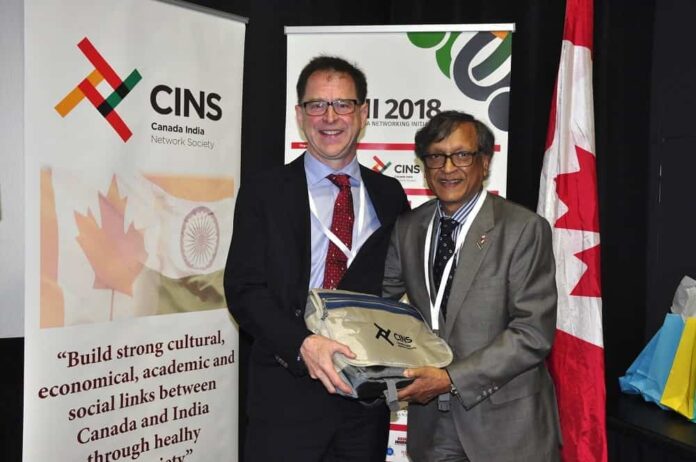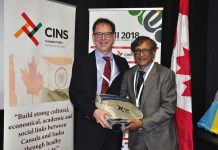UNDERLYING chronic illness, culturally ineffective health system gaps, lack of data/analysis, and other factors were leading causes for the dramatic spike in the number of COVID-19 cases for British Columbia’s South Asian population. As we move towards a new normal, there is opportunity to increase health equity for South Asians in British Columbia. The 2021 Canada India Network Society Conference will hold a virtual South Asian health conference on June 18-20 and will focus on these topics and more.
This year’s conference titled, “Lowering the Burden of Chronic Disease through Integrative Thinking to Integrated Medicine – Voices from the Trenches,” focuses on lowering the burden of chronic diseases through integrative thinking.
The three-day, South Asian health virtual conference will include engaging panels to discuss integrated thinking to integrated medicine in the context of COVID-19; also, how integrated thinking can reduce the burden of chronic disease. Speakers include some of Canada and India’s most forward-thinking healthcare professionals and yoga experts.
“There needs to be an urgent call of action on chronic illness like diabetes and hypertension for South Asians, particularly amidst COVID when we saw dramatic health disparities. Part of this is patients need to be empowered to take ownership of their health through integrative, culturally effective means,” says Dr. Arun Garg, Founder of Canada India Network Society (CINS).
“A big role is understanding the health system’s structural issues that are relevant to the South Asian community, because gaps exist. Bringing attention to this area of research and advocacy is crucial to understand why South Asians are at a higher risk for diabetes and hypertension. Chronic diseases are an epidemic in the community. However, there is very little conversation that takes place to inform the public that risk factors for South Asian are more than their diets or lifestyle. Chronic illness is complex and intersectional and includes a plethora of social and behavioural factors and need to be understood through the lens of social determinants of health.”
This South Asian-specific conference features an outstanding agenda with globally recognized experts from health care organizations, academia and technology. Future perspectives, new research, treatment, social/public policy and prevention, as well as innovation, particularly focusing on health and economic recovery will be showcased throughout the conference. It is open to the public, particularly those interested in South Asian health. Over 250 attendees registered thus far include researchers, clinicians, public health providers, health innovation professionals, public policy advisors, health care professionals, physicians, health care associations, and government agencies.
Happening from June 18 to 20, virtually over Zoom, the focus of CINS 2021 is “Lowering the Burden of Chronic Disease Through Integrative Thinking to Integrated Medicine – Voices from the Trenches”. There will be three days of in-depth, engaging panels to discuss integrated thinking context of COVID-19. Also including, how integrated thinking can reduce the burden of chronic disease. Speakers include some of Canada and India’s forward-thinking healthcare professionals and yoga experts.
Day 1 – Lowering the Burden of Chronic Disease and Integrative Thinking for Sustainable Health Post-COVID
Day 2 – Voices from the Trenches – projects and innovations for a healthy civil society and economic recovery
Day 3 – Experiential Yoga and its integrative health impact
Overall, the diverse range of conference speakers will discuss issues of health and inequity, focusing on South Asians. Like in past conferences, CINS 2021 will conclude with a series of recommendations to operationalize and improve health equity for South Asians and aims to work with the current government with a focus on research, advocacy, and development of a health strategy specific to South Asians.
This format has been successful in past conferences and has resulted in the following:
* SAHI – establishment of Fraser Health’s South Asian Health Institute
* SEHAT – the creation and strategy of the award-winning advocacy program, Sehat, that focuses on community-based outreach and partners with South Asian places of worship.
During the pandemic, Sehat and SAHI’s foundational work was used in the community based-outreach of vaccines in places of worship that helped to reduce the number of COVID cases in many hotspots.
* LEADS Leadership in India – Creation of an educational offering in partnership with Consortium of Accredited Healthcare Organizations (CAHO) for health providers in India to transform healthcare leadership using the five principles of LEADS Global (www.leadsglobal.ca). The program is widely used in Canada, but has been culturally adapted to support healthcare in India and urgently needed as COVID has demonstrated.
The 2021 conference is designed to support and facilitate links between Canada and India through specific projects and in doing so reimagine solutions for economic recovery post-COVID through the lens of health and health projects.
“While the focus for this conference is to bring together health experts in a South Asian health context and find ways to transform the health system from a sickness model to a wellness model of care, the end goal is to ensure that all peoples from all places and all races be provided the highest quality of care that is respectful of all cultures and beliefs,” says Dr. Arun Garg, Chair of CINS 2021 and CINS. “To achieve this, we need to understand there are gaps in the health system and close them in culturally effective ways.”
Lastly, a pre-conference dialogue occurred on June 4 with a panel of experts on COVID-19 and Mental Health/Opioid in the context of South Asians. Experts included Dr. Swaiman Singh (cardiologist from New Jersey, who is currently in at the Delhi borders in India), Dr. Arun Garg, Dr. Nitasha Puri, and Dr. Shimi Kang. The dialogue was recorded and can be found here https://youtu.be/LRH1e-














Comments are closed.